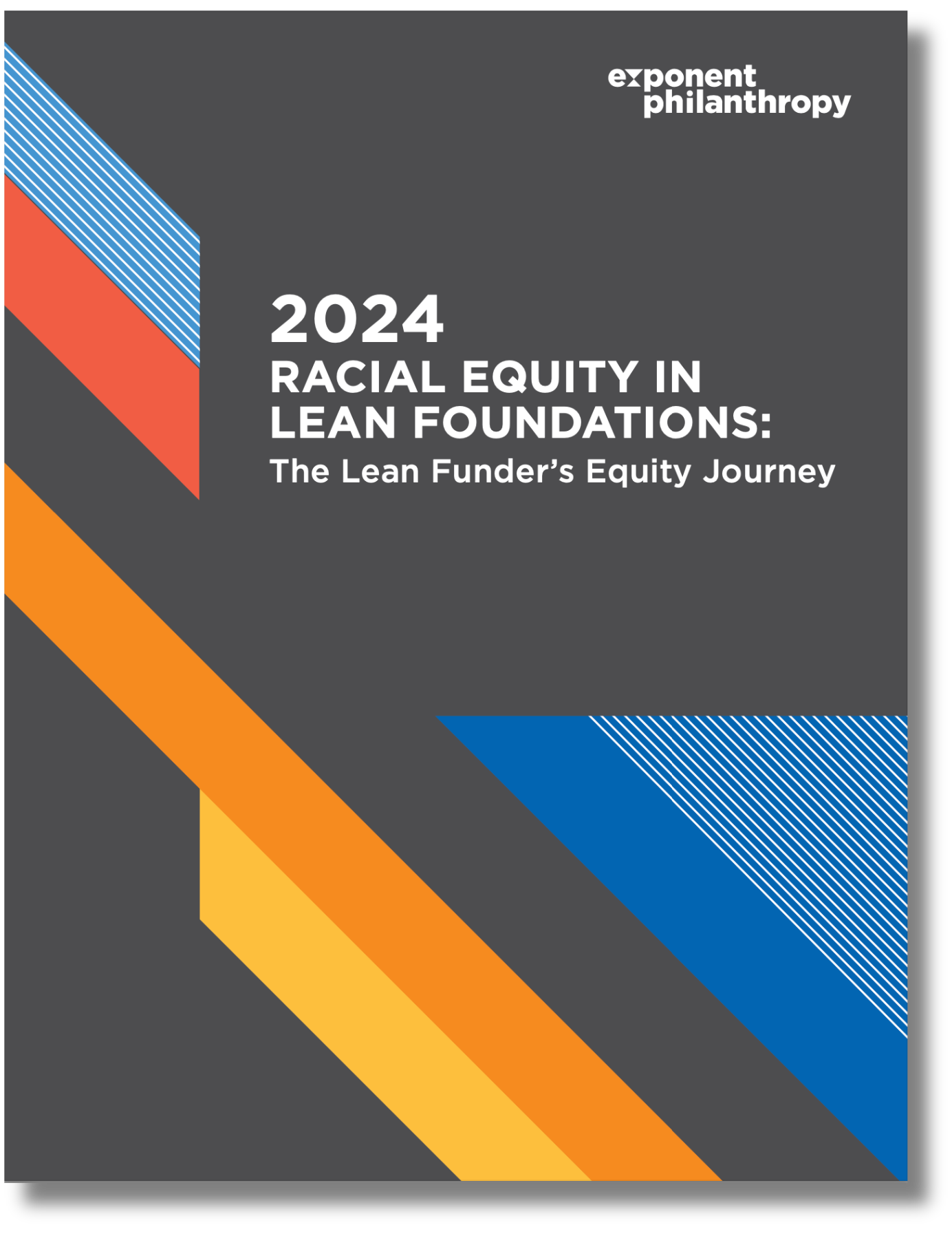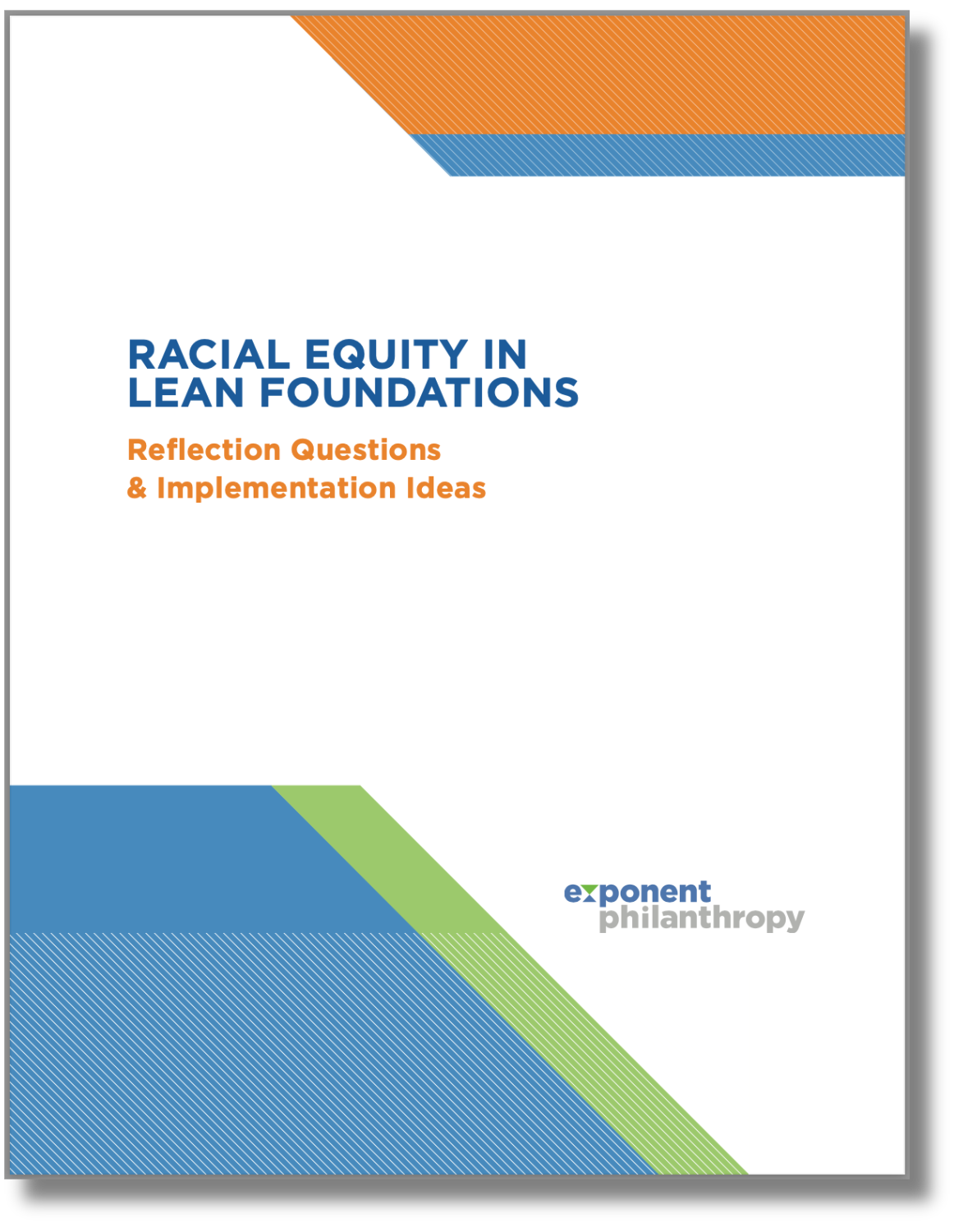
Exponent Philanthropy has released the fourth edition of its Racial Equity in Lean Foundations report, the most comprehensive version to date. The publication is based on survey data from over 300 lean foundations and qualitative interviews with more than 25 foundations, consultants, and nonprofits, offering insights into how lean funders are advancing equity. For the first time, the report also takes a deeper look into the equity journey of lean funders, including models for leading racial equity discussions, engaging boards in equity efforts, and incorporating equity into organizational practices.
The Current State of Racial Equity in Lean Foundations
The report’s first section analyzes racial equity trends within lean foundations. Below are three key findings from the report.
Finding #1: Foundation Boards and Staff Remain Predominantly White, But Diversity Is Slowly Increasing
Although most lean foundations are still mostly White, we’re starting to see more diversity on their boards and staff. The diversity within a foundation often reflects how committed it is to racial equity.
- Board Representation: Foundation boards are disproportionately White compared to the U.S. population. While White individuals make up 59% of the U.S. population, they account for 89% of foundation board members. Conversely, Black, Indigenous, and People of Color (BIPOC) individuals, who make up 41% of the U.S. population, represent just 11% of foundation board members.

- Homogeneity: About 68% of foundation boards are composed entirely of White individuals, with only 2% comprising only People of Color. However, this is slowly changing. The percentage of all-White boards dropped from 74% in 2018 to 68% in 2022, while boards with two or more BIPOC members increased from 13% to 20%.

- Staff Diversity: A similar disparity exists among foundation staff. While White individuals account for 75% of foundation staff, BIPOC individuals make up only 25%. Furthermore, BIPOC staff are more likely to hold programmatic or support roles, with only 10% of CEOs at lean foundations identifying as BIPOC. Despite some progress—foundations with an all-White staff decreased from 78% to 62% over five years—representation of BIPOC individuals in leadership roles remains limited.

Finding #2: The Relevance of Racial Equity Has Fluctuated in Recent Years
The importance of racial equity to lean foundations’ missions has fluctuated over the past five years, peaking in 2020 before returning to pre-2020 levels.
- Survey Data: Lean funders were asked to rate the relevance of racial equity to their mission. In 2020, 37% considered it “very relevant,” the highest percentage in five years. However, this figure dropped to 31% in 2022, aligning with pre-2020 levels.

- Demographic Influence: Foundations with greater board and staff diversity are more likely to view racial equity as a key component of their mission.
Finding #3: Foundations That Prioritize Racial Equity Adopt Stronger Grantmaking Practices
Foundations that see racial equity as highly relevant to their mission tend to adopt more effective grantmaking practices. These practices not only support racial equity but also strengthen relationships with grantees and the broader community.
- Learning Mindset: Foundations that prioritize racial equity are more likely to assess their impact using various methods, including gathering grantee feedback and conducting formal reflections at the board or staff level. Foundations that do not consider racial equity relevant are less likely to engage in such assessments.

- General Operating Support: Foundations that view racial equity as very relevant are more likely to provide general operating support grants. The percentage of foundations offering these grants has risen from 44% in 2018 to 52% in 2022.

- Grantmaking Strategies: Other strategies more commonly adopted by foundations focused on racial equity include streamlining grant requirements, funding community organizing, providing seed grants, and supporting evaluation efforts.

Moving Forward with Equity in Lean Philanthropy
The full report offers additional insights into these findings and explores ongoing efforts to advance racial equity within lean foundations. In Part Two of the publication, the equity journey of lean funders is explored further, including models for leading racial equity discussions, engaging boards in equity efforts, and embedding equity into organizational practices.
 The Lean Funder’s Equity Journey
The Lean Funder’s Equity JourneyRacial equity is crucial to effective philanthropy, and lean foundations are uniquely positioned to make a significant impact. Our 2024 publication delves into how these foundations are incorporating racial equity into their work to drive better decisions, achieve more equitable outcomes, and amplify their philanthropic impact. Read the report!
 Reflection Questions and Implementation Ideas
Reflection Questions and Implementation IdeasThis companion to the annual Racial Equity in Lean Foundations report offers questions for lean funders looking to address racial equity in their foundations and work. It will help you identify strengths and areas for improvement. Get the free resource!
About the Author
Brendan McCormick is the associate director of research and publications at Exponent Philanthropy. He works with members, partners, and staff to develop resources and research on our funder community.
